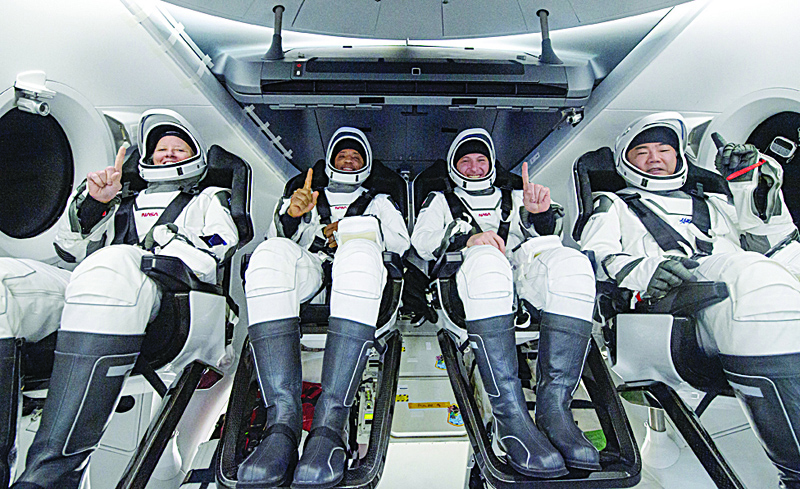 NASA astronauts from left:- Shannon Walker, Victor Glover, Mike Hopkins, and Japan Aerospace Exploration Agency (JAXA) astronaut Soichi Noguchi, strapped in their seats inside the SpaceX Crew Dragon Resilience spacecraft onboard the SpaceX GO Navigator recovery ship shortly after having landed in the Gulf of Mexico off the coast of Panama City yesterday. - AFP
NASA astronauts from left:- Shannon Walker, Victor Glover, Mike Hopkins, and Japan Aerospace Exploration Agency (JAXA) astronaut Soichi Noguchi, strapped in their seats inside the SpaceX Crew Dragon Resilience spacecraft onboard the SpaceX GO Navigator recovery ship shortly after having landed in the Gulf of Mexico off the coast of Panama City yesterday. - AFPWASHINGTON: A SpaceX Crew Dragon capsule carrying four astronauts back to Earth splashed down off Florida early yesterday in NASA's first nighttime ocean landing in more than 50 years. The crew reported they were feeling well after their arrival back on Earth following a nearly six-month mission aboard the International Space Station, NASA said.
The capsule splashed down at 2.56 am (0656 GMT) in the dark in the Gulf of Mexico off Panama City after a six-and-a-half-hour flight from the ISS, night-vision images relayed by NASA's WB-57 high-altitude research aircraft showed. Teams aboard the Go Navigator recovery ship retrieved the capsule and hoisted it onto the deck about half an hour later. It was the first nighttime splashdown for NASA since the crew of Apollo 8 arrived in the Pacific Ocean on December 27, 1968. Commander Michael Hopkins was the first to emerge after the hatch was opened, doing a little jig as he set foot on deck, followed shortly after by fellow NASA astronaut Victor Glover.
"On behalf of Crew-1 and our families, we just want to say thank you ... It's amazing what can be accomplished when people come together. Y'all are changing the world. Congratulations. It's great to be back," Hopkins said in a NASA tweet. NASA astronaut Shannon Walker and Japan's Soichi Noguchi were the other two aboard. "Welcome home Victor, Michael, Shannon, and Soichi, and congratulations to the teams at NASA and SpaceX who worked so hard to ensure their safe and successful splashdown," said new NASA administrator Bill Nelson.
"We've accomplished another incredible spaceflight for America and our commercial and international partners. Safe, reliable transportation to the International Space Station is exactly the vision that NASA had when the agency embarked on the commercial crew program."
71 million miles
The four astronauts went to space last November as the crew on the first fully operational mission to the ISS aboard a vehicle made by Elon Musk's SpaceX, which has become NASA's favored commercial transportation partner. They traveled 71.2 million miles (114.6 million kilometers) during their 168 days in orbit (including 167 days aboard the space station), NASA said.
After medical checks, the four astronauts will be flown by helicopter to Pensacola to board a plane for Houston to be reunited with their friends and family, NASA said. Seven astronauts remained on the ISS including a new crew of four who arrived on a different SpaceX craft last week. "Thanks for your hospitality," Hopkins said earlier as the capsule undocked from the space station for its return journey. "We'll see you back on Earth."
Prior to that, two American astronauts made a test mission to the ISS in May and stayed for two months. That was the first launch to the ISS from US soil since the end of the Space Shuttle program in 2011. It was also the first crewed mission run by a private company, as opposed to NASA. Until then US astronauts had caught rides to the ISS aboard Russian spacecraft. - AFP









